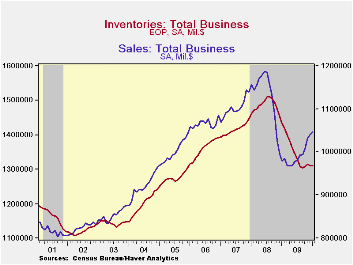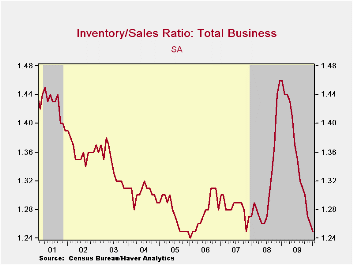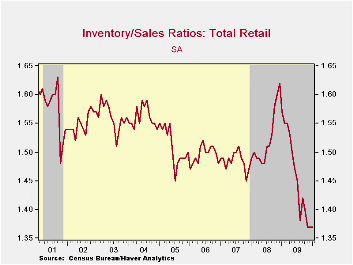 Global| Mar 12 2010
Global| Mar 12 2010U.S. Business Inventories Roughly Unchanged; I/S Ratios Depressed
by:Tom Moeller
|in:Economy in Brief
Summary
There seems to be no hurry for businesses to accumulate inventories. A modest drop in January inventories followed a December decline that was little-revised. It left the rate of decline just a little less than at the peak rate of [...]

There seems to be no hurry for businesses to accumulate inventories. A modest drop in January inventories followed a December decline that was little-revised. It left the rate of decline just a little less than at the peak rate of decumulation last summer. This drop occurred at the same time as a 0.6% increase (6.8% y/y) in January business sales. As a result, the inventory/sales ratio fell to the lowest level since late-2007.
Retailers' inventory/sales ratio remains at their cycle low. The I/S ratio for apparel stores fell to a record low as inventories fell 9.3% y/y. The I/S ratio for general merchandise stores also fell to a record low. Wholesalers' ratio also was at the record low while the I/S ratio in the factory sector fell to the lowest level since August 2008.
During the last few months, these depressed ratios reflect little inclination by business to accumulate inventories which have been flat across industries. Notably, the retail and wholesales sectors continue to shed inventories despite higher sales. The factory sector seems to feel the same way despite a modest January uptick in inventory levels.
The business sales and inventory data are available in Haver's USECON database.


| Business Inventories (%) | January | December | November | Y/Y | 2009 | 2008 | 2007 |
|---|---|---|---|---|---|---|---|
| Total | -0.0 | -0.3 | 0.5 | -8.6 | -9.8 | 0.4 | 4.0 |
| Retail | -0.1 | 0.2 | -0.2 | -8.7 | -10.6 | -3.3 | 2.5 |
| Retail excl. Auto | -0.2 | 0.4 | -0.3 | -4.4 | -4.9 | -1.9 | 2.7 |
| Wholesale | -0.2 | -1.0 | 1.6 | -9.7 | -10.4 | 2.5 | 6.2 |
| Manufacturing | 0.2 | -0.2 | 0.2 | -7.5 | -8.7 | 2.2 | 3.7 |
Tom Moeller
AuthorMore in Author Profile »Prior to joining Haver Analytics in 2000, Mr. Moeller worked as the Economist at Chancellor Capital Management from 1985 to 1999. There, he developed comprehensive economic forecasts and interpreted economic data for equity and fixed income portfolio managers. Also at Chancellor, Mr. Moeller worked as an equity analyst and was responsible for researching and rating companies in the economically sensitive automobile and housing industries for investment in Chancellor’s equity portfolio. Prior to joining Chancellor, Mr. Moeller was an Economist at Citibank from 1979 to 1984. He also analyzed pricing behavior in the metals industry for the Council on Wage and Price Stability in Washington, D.C. In 1999, Mr. Moeller received the award for most accurate forecast from the Forecasters' Club of New York. From 1990 to 1992 he was President of the New York Association for Business Economists. Mr. Moeller earned an M.B.A. in Finance from Fordham University, where he graduated in 1987. He holds a Bachelor of Arts in Economics from George Washington University.






